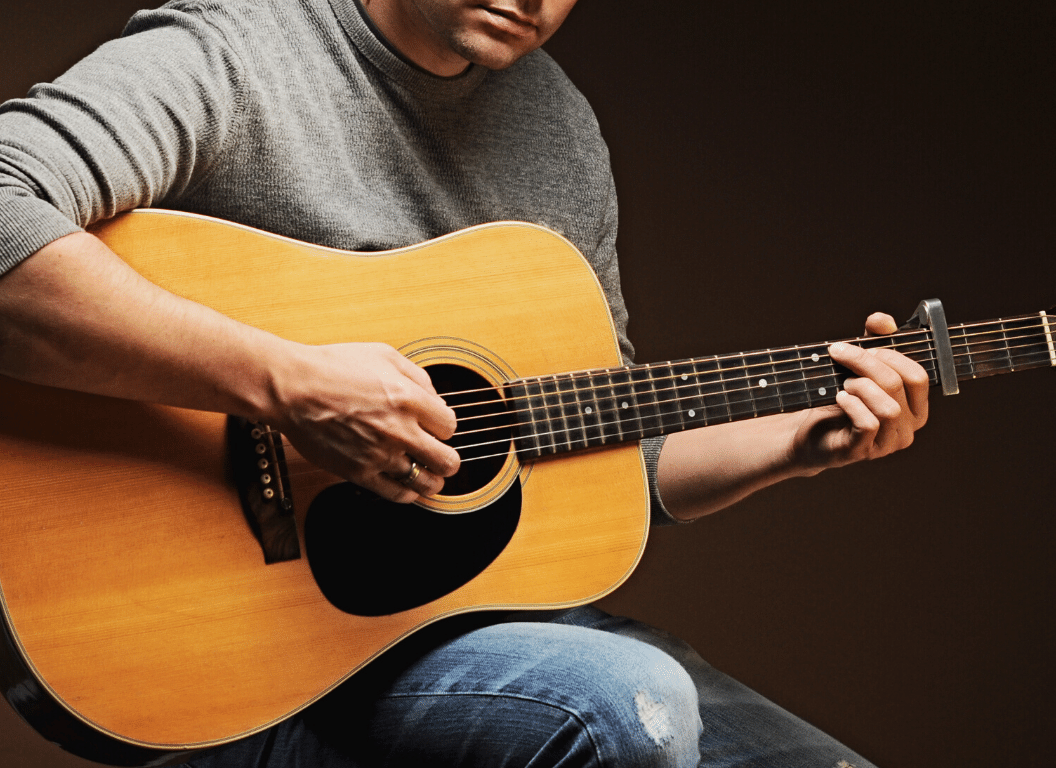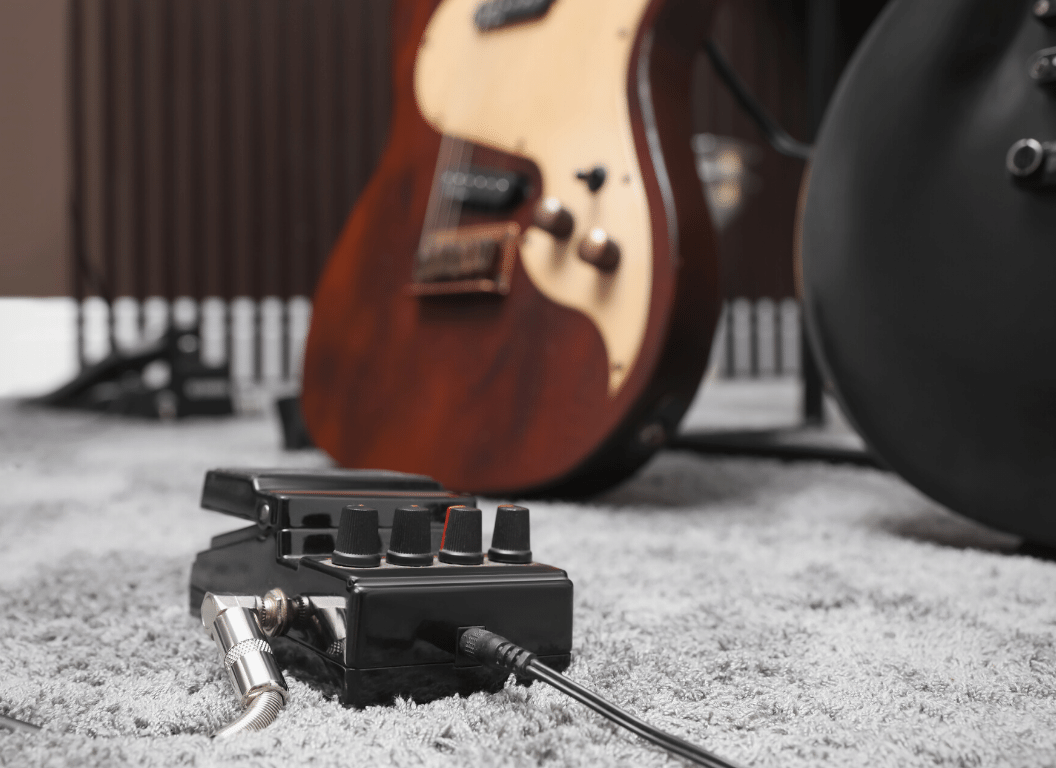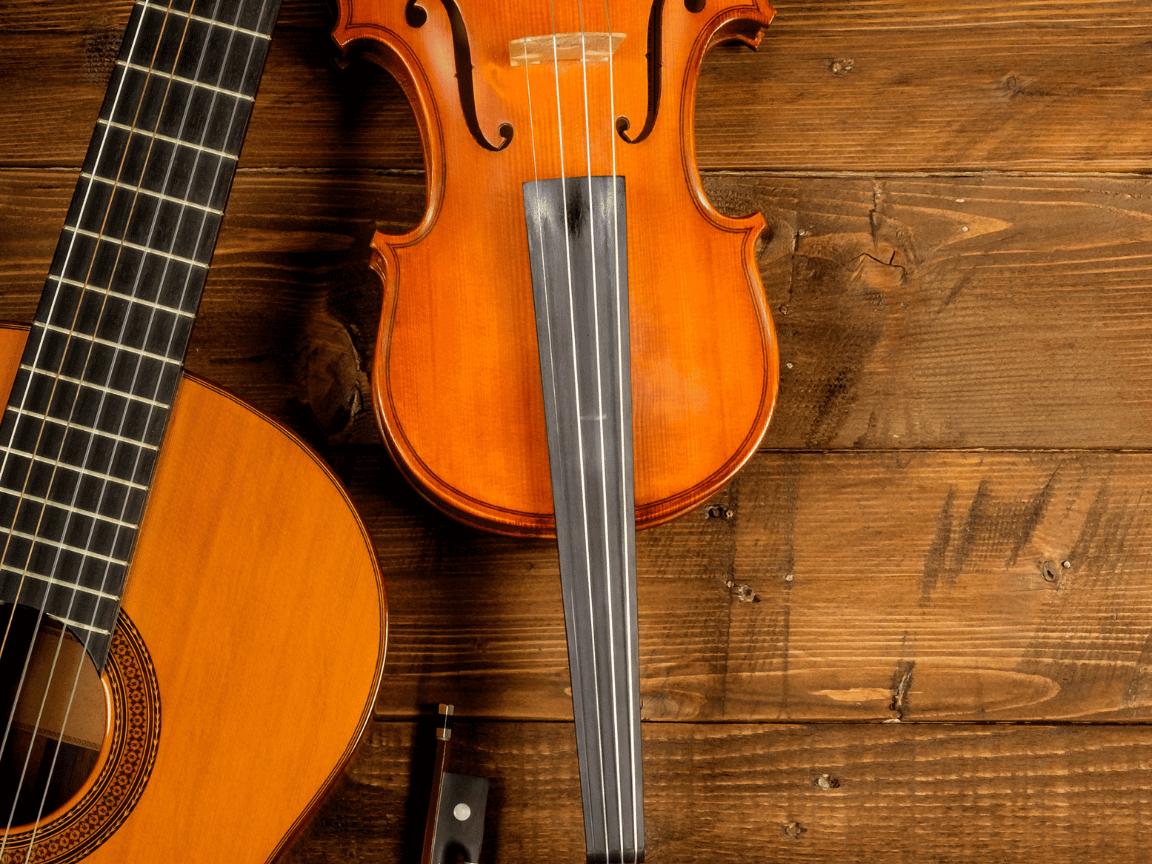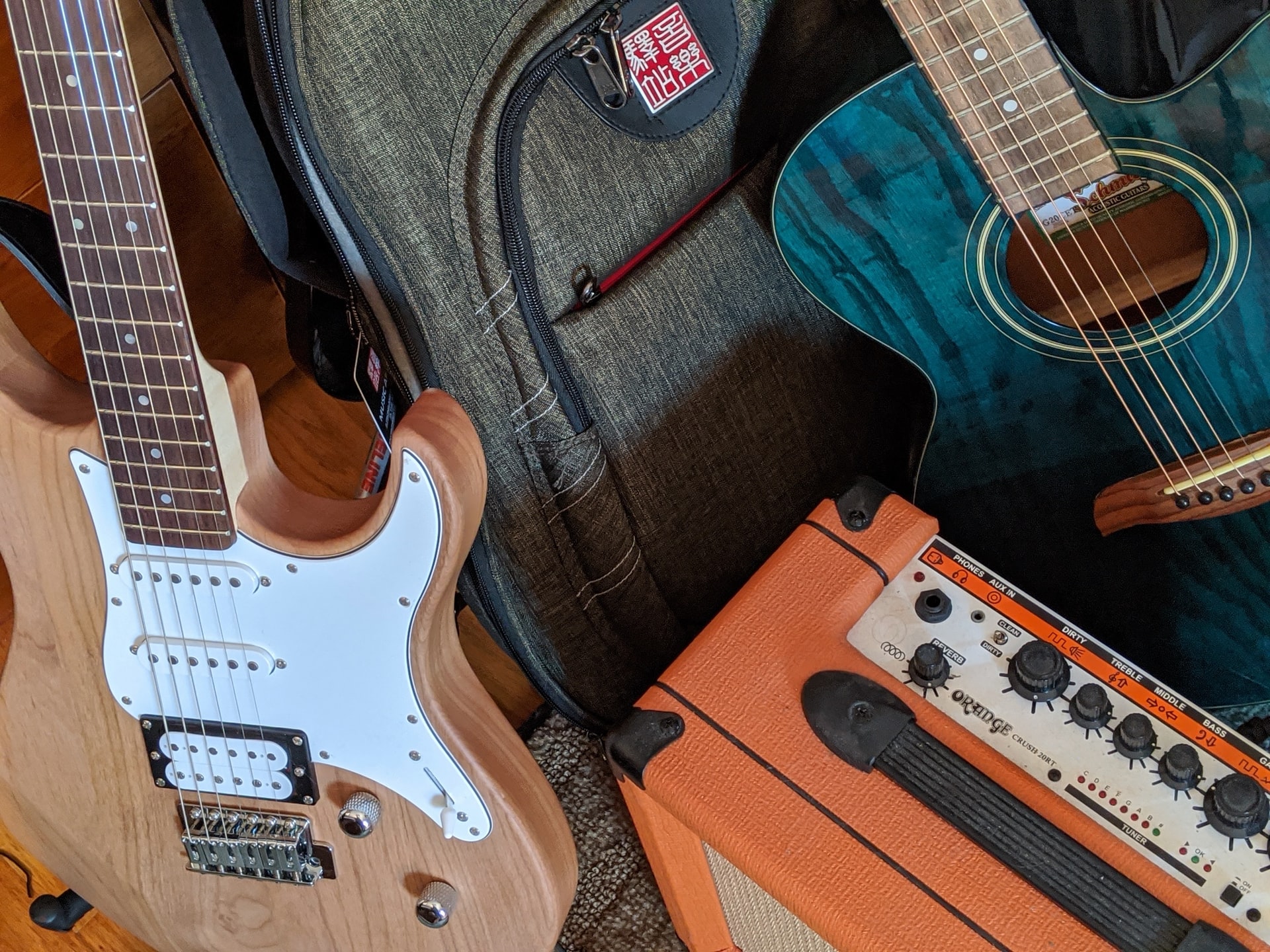The journey towards mastering guitar involves more than picking up technical skills or mastering music theory.
It also requires a self-discovery process that extends beyond learning the basics and into finding your own individual sound.
This can be a thrilling, yet challenging endeavour as it involves introspection, technique adjustment, and consistent practice.
Moreover, it’s about creating a perfect symbiosis between musical understanding and personal expression.
Highlighting your particularities and embracing them in your music can lead to the birth of a unique playing style.
This article seeks to guide you in uncovering and honing this personal style to elevate your guitar playing skills.
Table of Contents
- How To Find Your Unique Guitar Playing Style?
- Exploring Various Genres of Music
- How Important is Regular Practice in Developing a Unique Style?
- How To Find Your Distinctive Guitar Voice Through Experimentation?
- Taking Inspiration from Renowned Guitarists
- What are Key Techniques to Incorporate in Your Playing Style?
- The Role of Musical Preferences in Defining Your Style
- How Does Improvisation Influence Guitar Style?
- What to Expect when Adjusting Your Technique for Personal Expression
- The Bottom Line
How To Find Your Unique Guitar Playing Style?
Finding your unique guitar playing style entails exploring different genres of music, practicing regularly, and experimenting with various playing techniques. It is also crucial to listen to various guitarists, understand their styles, and then incorporate elements you enjoy into your own practice. Ultimately, finding your unique style is a personal journey that unfolds through continuous practice, exploration, improvisation, and keen attention to your individual musical preferences.
While the guidance provided offers a holistic approach to developing your unique guitar playing style, it does not end here.
This discussion paves the way to delve deeper into the world of guitar playing techniques and the critical role that your musical taste plays in shaping your style.
The succeeding sections offer insights about enhancing your musical ear, exploring unconventional playing techniques, and understanding the intricate relationship between rhythm and your guitar playing style.
These sections aim to provide a well-rounded perspective to not just play, but truly embody the guitar.
This comprehensive coverage is designed to assist you in your endeavor to create a resonant and distinctly personal musical expression.
Exploring Various Genres of Music
The journey to becoming a versatile guitarist begins with an exploration of various genres of music.
While it’s essential to start with a genre you’re passionate about, expanding your musical repertoire will not only improve your technique but also enrich your understanding of different cultures and music histories.
Moving beyond your comfort zone and diving into unfamiliar musical territories can inspire creativity and open up new possibilities in your guitar playing.
Each genre of music, be it blues, rock, jazz, country, or classical, is characterized by distinct chord progressions, rhythms, and tonal structures.
These attributes constitute the fundamentals of that particular style.
By studying and practicing these specifics, you can gain proficiency in a given genre and even incorporate its distinctive elements into your unique style.
Understanding the Essence of Different Genres
Understanding the essence of each genre is critical while studying it.
The rhythm and emotion behind blues, the energy of rock, the complexity and improvisation of jazz, the storytelling in country music, and the detail-oriented nature of classical music – all provide unique learning opportunities.
Studying these aspects can greatly improve your musicianship and technique, giving you a well-rounded guitar playing approach.
The commitment to understanding the attributes of different genres involves studying the work of musicians who have shaped these styles.
Observing their techniques, modal choices, and stylistic nuances can be an immense learning experience.
Transcribing their work by ear improves your listening skills and aids in understanding their approach towards music.
Transcribing their work by ear improves your listening skills and aids in understanding their approach towards music.
This method of deconstructing their music, note by note, is not just beneficial for your ears but also for your hands.
It allows you to emulate their techniques, in turn, improving your command over your instrument and broadening your understanding of music theory.
Applying the Learned Techniques
Once you’ve started to understand and play different genres, it’s time to apply what you’ve learned into actual playing scenarios.
This could involve playing along with songs, joining a band, or even composing your own pieces.
Putting what you’ve learned into practice will test your skills and help you identify areas for improvement.
Another valuable practice involves fusion of genres – an innovative technique to create your unique sound.
You can experiment by blending the stylistic nuances and techniques of one genre into another.
This exploration and fusion are how new sub-genres are created and is a great way to differentiate your guitar playing style.
Fusion of genres is an innovative technique to create your unique sound.
The more genres you acquaint yourself with, the wider your musical vocabulary extends.
Each genre you explore leaves an impression and contributes to your musical identity, enhancing your authenticity as a musician.
Thus, exploring various genres of music is a surefire way to enrich your musical journey and improve your guitar-playing skills.
Exploring Different Cultural Music
Beyond the genres, it is worth exposing yourself to the music of different cultures.
Music around the world varies; from the African rhythmic patterns, the Latin American scales, to the Indian ragas, each has a unique sound and technique.
Exploring the traditional music of different cultures can give you a new perspective and inspire you to incorporate elements of these styles into your own music.
This cultural exploration makes your musical journey as a guitarist, all the more enriching and fulfilling.
Above all, the exploration of various genres and cultures in your musical journey offers a holistic approach to your growth as a guitarist.
It opens up many doors and routes for you to explore, leading to mastering the art of guitar playing.
How Important is Regular Practice in Developing a Unique Style?
Most aspiring guitarists understand that regular practice is a critical component in developing their ability.
Nonetheless, it is essential to emphasize that consistent practice is crucial not only for enhancing technique but also for forming a distinctive style.
Just like any art form, music is a form of self-expression.
When you establish a unique playing style on the guitar, it does not only showcase your technical prowess but also your distinct artistic identity.
Practice and Developing Muscle Memory
At its core, guitar playing involves physical activity, and regular practice helps develop muscle memory.
This is the automatic response of your muscles to perform particular movements without conscious thought.
The technique of playing an instrument like the guitar involves a combination of fine motor skills.
Regular practice, through repetition, helps embed these movements into your muscle memory.
Therefore, mastering commonly used chord progressions, positions, and scales becomes a more streamlined process through consistent and diligent practice.
“Regular practice, through repetition, helps embed the movements needed in playing guitar into your muscle memory.”
Not only does this make playing easier and faster, but it also frees your mental bandwidth to focus on other aspects of your playing such as interpretation, dynamics, and, importantly, developing your unique style.
Practice and Experimentation
Another crucial aspect of practice is the opportunity it provides for experimentation.
As you become more comfortable with the basics of guitar playing through regular practice, you can start to explore and experiment with different techniques and styles.
Perhaps you might want to try a new fingering pattern, attempt a difficult song, or experiment with unique strumming techniques.
Regular practice creates a safe space where making mistakes is not only acceptable but encouraged.
Remember, many of the world’s greatest guitarists have developed their signature styles by veering away from traditional techniques and daring to do something different.
Regular Practice and Consistent Feedback
Lastly, regular practice facilitates an environment for consistent feedback.
The more you practice, the more opportunities you have to critically listen to your playing, assess your strengths and opportunities for improvement.
Feedback doesn’t necessarily have to come from an external source like a teacher or mentor, although that can be significantly beneficial.
Self-assessment is an important part of regular practice too.
“Regular practice facilitates an environment for consistent feedback, as it provides more opportunities to critically listen to your own playing and assess your progress.”
Maybe you consistently struggle with a particular chord, or you’re not quite nailing the tone on a particular piece.
Recognizing these areas and addressing them becomes integral to your unique guitar-playing journey.
The role of regular practice in developing a unique guitar-playing style cannot be overstated.
It serves not just as a tool for honing skills and building muscle memory, but it also encourages experimentation and self-reflection, both of which are critical to establishing a distinct musical voice.
How To Find Your Distinctive Guitar Voice Through Experimentation?
Experimentation is the cornerstone of discovering your unique guitar voice.
It allows you to step out of your comfort zone and flirts with different techniques, guitar riffs, and rhythms.
In turn, this not only enhances your guitar playing abilities but it also spurs you on the path of creating a sound that’s distinctively yours.
Why Experimentation is Important?
An important reason for experimentation is that it helps break monotony in music.
It challenges you to constantly reinvent and reinterpret the music you create.
You are encouraged to pick up tidbits from various musical genres, experiment with them, and relearn the true essence of music.
This process acts as a springboard for musical innovation.
For instance, it was through experimentation that the guitar effects like feedback and distortion were discovered, redefining the rock genre in the process.
An important reason for experimentation is that it helps break monotony in music.
In essence, this monotony-breaking aspect of experimentation also plays a vital role in your musical growth and learning.
It pushes you to create something that is not a mere imitation of what has been already played before but is original and unique.
Experimenting with Various Techniques and Sounds
Another significant aspect of experimentation is playing with different guitar techniques.
You can spend quite a bit of time strumming, bending, sliding, tapping, and playing around with hammer-ons and pull-offs.
Likewise, you could also explore different kinds of guitars like classical, acoustic, or electric.
Then, there are various ways of producing sounds such as fingerstyle, pick-style, slap, or two-handed tap.
The combination of different sounds and techniques ultimately aids in finding your guitar voice.
You can spend quite a bit of time strumming, bending, sliding, tapping, and playing around with hammer-ons and pull-offs.
By continually experimenting, you will start identifying what you like and what resonates with you, slowly molding your distinctive guitar style.
It is also about breaking free from the conventional rules and norms of playing guitar and daring to do something different.
Though experimentation may sound exhilarating, it is also time-consuming.
It requires patience and dedication to come up with something spectacular and genuinely unique.
New techniques or sounds do not come magically but are a culmination of months and years of practice, exploration, and sometimes, sheer will.
It is therefore important to be patient and not rush the process of self-discovery.
After all, in the journey of experimentation, the process is as much rewarding as the end result.
Though experimentation may sound exhilarating, it is also time-consuming.
It requires patience and dedication to come up with something spectacular and genuinely unique.
Experimentation is a journey of musical exploration that nurtures your unique guitar voice.
It is about embracing mistakes, celebrating small victories, and always craving for something different and unique.
Taking Inspiration from Renowned Guitarists
One of the most impactful ways to improve your guitar playing and develop a unique style is to draw inspiration from renowned guitarists.
Listen to a wide range of musicians across multiple genres to expose yourself to a rich tapestry of musical influences.
By doing so, not only do you understand different techniques, but also develop an ear for various playing styles.
It’s essential to bear in mind that inspiration is not imitation, you aren’t trying to copy these musicians, instead, you’re learning from their skill and creating your own unique style.
Role of Diversity in Choosing Inspirations
Diversity in your music inspirations can have a huge effect on your guitar playing style.
If you only listen to guitarists within one genre, you risk limiting your growth as a musician.
For example, a blues guitarist could learn a lot by listening to jazz or classical guitarists, bringing unique elements of these styles into their own playing.
Listening to a variety of renowned guitarsts across multiple genres exposes you to different playing styles and techniques, fostering tremendous growth in your own guitar playing.
Indeed, by doing so, you’re expanding your musical horizons and creating a fertile ground for developing a unique guitar style.
The routine exploration of various guitarists and their techniques provides invaluable insights for your own guitar journey.
Deciding Who To Listen To
When it comes to selecting which guitarists to listen to, choose those who resonate your musical preferences.
Also, consider the guitarists who are innovators in their genres, as they’ve often developed unique styles that are worth studying.
Draw from various sources, from blues legends like B.B. King, to rock innovators like Jimi Hendrix, or even modern guitar maestros like Joe Satriani.
Each of these artists have distinctive techniques and sounds offering a wealth of information for you to incorporate into your style.
Consider listening to guitarists who are innovators in their genres, as they often have developed unique styles and techniques that are worth studying.
This not only broadens your understanding of the instrument, but also encourages you to think outside the box when developing your own style.
Remain open to the lessons each of these musicians have to offer and let their artistry influence your own guitar play.
By watching this video, you will gain a deeper understanding of how to effectively learn scales on the guitar.
It also provides valuable insights into how mastering scales can be beneficial in developing a unique playing style.
What are Key Techniques to Incorporate in Your Playing Style?
Learning Basic Techniques
The foundation of excellent guitar playing is a solid understanding of essential techniques.
These include the likes of correct finger placement, strumming skills, and the ability to smoothly transition between chords.
It’s equally crucial to master basic scales, as these form the backbone of many different songs and musical styles.
Practicing these scales regularly can also help improve your dexterity and speed.
The foundation of excellent guitar playing is a solid understanding of essential techniques.
This fundamental knowledge is what allows guitarists to explore more advanced techniques and styles later on.
Without a firm grasp on the basics, you risk developing poor habits that can be hard to break.
It’s always better to take the time to learn techniques properly from the beginning, as this will pay off in the long run.
Exploring Advanced Techniques
Once the basics are second nature, you can start exploring more advanced guitar techniques.
These could include fingerpicking, slide guitar, hammer-ons and pull-offs, and many others.
Each of these techniques adds a different texture to your playing and can help diversify your style.
Once the basics are second nature, you can start exploring more advanced guitar techniques.
It’s essential to remain patient and consistent when learning these advanced techniques.
They can take time, but with regular practice, you can incorporate them into your playing effortlessly.
Remember, the ultimate goal is to express your unique musical voice; don’t rush the process just to play a funky trick or impress others.
The Impact of Technique on Your Playing Style
The techniques you choose to incorporate into your playing will greatly influence your style.
For example, a blues guitarist might make heavy use of slide guitar and bending techniques, while a flamenco guitarist might focus more on lightning-fast strumming patterns.
However, it’s also worth noting that being proficient in a wide range of techniques can enhance your versatility as a guitarist and allow you to play a broader array of musical genres.
The techniques you choose to incorporate into your playing will greatly influence your style.
Your chosen techniques and the way you utilize them become your unique signature in music.
Over time, this signature becomes your style and is what sets you apart from other guitarists.
Being aware of the impact of these techniques can help you shape your playing style consciously and deliberately, leading to a more authentic and personal musical expression.
The Role of Musical Preferences in Defining Your Style
When it comes to guitar playing, your individual musical preferences have a significant impact on defining your style.
Genres of music that you are most drawn to naturally shape the way you approach the guitar.
For instance, if you’re a fan of blues, you would probably lean towards a more soulful, expressive style of playing.
Your Favorite Artists Plays a Crucial Role
Consider the artists you admire most.
The musical aspects that you appreciate in their work will undoubtedly influence how you play the guitar.
This is because we wire our brains to selectively absorb information – in this case, musical knowledge – that aligns with what we already like and enjoy.
“
Consider the artists you admire most.
The musical aspects that you appreciate in their work will undoubtedly influence how you play the guitar.
“
Reinforcing this idea of musical preferences defining your style, we are naturally inclined to replicate the techniques and aspects of music we enjoy, thus shaping our unique guitar ‘voice’.
Exploring Different Genres
While your immediate preferences play a significant role, it’s equally important to explore various genres and artists to broaden your musical perspective.
As a guitarist, you never want to be genre-locked.
Dabbling in different genres will provide you various techniques and sensibilities that will enrich your playing style.
Not Just about Fast Picking and Complex Chords
A misconception among many beginner guitarists is that being ‘good’ is about mastering fast picking techniques or being able to transition smoothly between complex chord voicings.
However, the true measure of a great guitar player is the capability to express oneself musically and relate to the audience on an emotional level.
Music is a language, and like any language, the sincerity of expression matters more than the complexity of the vocabulary.
“
Music is a language, and like any language, the sincerity of expression matters more than the complexity of the vocabulary.
“
Your musical preferences guide you towards that sincerity.
They shape your guitar style so that your music expresses who you are as an individual and artist.
Incorporating these personal tastes and emotions into your playing style makes your guitar voice unique, captivating, and truly yours.
Beyond Genres and Artists
Your preferences go beyond just genres and artists.
They include everything from the kind of guitar you enjoy playing the most, your favored guitar plugins, and even your preferred setting to play in.
Ultimately, your personal preferences shape your unique style but always remember to stay open and adaptable.
Continually explore, learn and experiment, for the world of music is vast and incredibly diverse.
Watching this video would provide more insights on common pitfalls that beginners should avoid when starting to play the guitar.
You’ll also gain tips and advice that may give you a head start on crafting your personal style.
How Does Improvisation Influence Guitar Style?
Understanding the Role of Improvisation
In the universe of music, improvisation stands as a critical method through which artists express themselves in an unstructured and spontaneous way.
This concept is deeply ingrained in the world of guitar playing, and has the ability to significantly influence a guitarist’s style.
Improvisation allows guitarists to explore beyond written music scores, providing a platform for the creation of unique melodies and riffs.
It fosters creative freedom, enhances technical skills, and nurtures musical sensibilities in a nonrestrictive environment.
Furthermore, the use of improvisation helps a guitarist grow and evolve their musical style, as it encourages them to try new approaches and techniques.
Improvisation allows guitarists to explore beyond written music scores, providing a platform for the creation of unique melodies and riffs.
This quoted sentence emphasizes that improvisation is a tool that encourages exploration and creation in guitar playing.
Surely, the creation of unique melodies and riffs fuels the development of a distinctive guitar style.
Consequently, it nurtures creativity, develops skills, and contributes to a player’s individual musical identity.
The Impact of Improvisation on Technical Skills
The process of improvisation not only enhances creativity but also plays a crucial role in developing technical skills.
As a guitarist improvises, they’re likely to experiment with varying chord progressions, scales, and playing techniques.
This experimentation could lead to the discovery of new finger placements, strumming styles, or rhythm patterns that they might not have discovered otherwise.
Furthermore, the more a guitarist improvises, the more comfortable they become with their instrument, increasing their capability to navigate the guitar’s fretboard effortlessly.
A high level of comfort with their own guitar can lead to the development of a distinctive playing style that is as unique as the player themselves.
Improvisation as a Tool for Expressing Emotion
Many guitarists view improvisation not just as a technical exercise, but as a tool for expressing emotion.
Each improvised note or chord can convey a specific feeling or sentiment, adding colour and depth to the music.
Interestingly, a player’s emotional state at the time of playing can greatly influence the music they create during improvisation.
This emotional expression through improvisation contributes to a guitarist’s unique style, giving their music a personal touch that is recognisable and memorable.
Each improvised note or chord can convey a specific feeling or sentiment, adding colour and depth to the music.
As discussed, the ability to express emotion through improvisation significantly contributes to a guitarist’s style.
Not only does it make their music more relatable and authentic, but it also allows listeners to connect more deeply with the emotions portrayed in their music.
Thus, emotion and improvisation become inextricably intertwined, each feeding off and enhancing the other in the creation of musical art.
What to Expect when Adjusting Your Technique for Personal Expression
The process of adjusting your guitar playing technique to suit personal expression is bound to be an exciting journey filled with new realizations, some good and some that might challenge you.
Embrace Changes to Traditional Techniques
Invariably, modifying your guitar technique requires a willingness to step outside the conventional boundaries established by traditional guitar playing approaches.
It involves reshaping, redefining and even ditching some traditional techniques in pursuit of your unique voice.
One’s unique voice on the guitar is derived from their personal expression and not from strictly sticking to established playing techniques.
Such a departure from orthodox methods may seem daunting, but it’s an integral part of developing a unique guitar style.
This challenging path is often filled with trial and error, but it is through this very process that you can unlock your distinctive guitar voice.
Expect Unexpected Discoveries
As you journey through the process of tweaking your technique for personal expression, expect to stumble upon discoveries about your own creative style.
These findings may open up new musical avenues you’d never considered before.
This process is, therefore, not just about altering your technique, but it’s also an explorative journey that can bring you closer to your unique musical identity.
Such a process should be free from any rush or pressure to get things right instantly.
Allow your instinct and passion for music guide you, and be ready to embrace all outcomes as part of your path.
Adjusting Techniques Can Be Unsettling
It’s crucial to recognize that the process of altering your guitar technique comes with its share of unsettling experiences.
You may feel uncomfortable or even lost, as you leave behind your old methods and adapt to new techniques.
However, this discomfort should not discourage you; instead, it should serve as a motivator that keeps pushing you towards finding your distinctive guitar voice.
Embrace the idea that with each day, you’re moving a step closer to refined artistry – even if it might not seem like it in the moment.
Remember, true mastery takes time and involves making peace with the initial discomfort that comes with learning new things.
The Bottom Line
Mastering the guitar and developing a unique style doesn’t happen overnight.
It begins with understanding the fundamental aspects and expands with exploring various music genres.
Regular practice paired with constant experimentation is critical in finding your unique guitar voice.
Drawing inspiration from renowned guitarists can also shape your style, along with incorporating key techniques in your playing.
Remember that your musical preferences are central in defining your style and that improvisation also plays a significant part in molding it.
Adjusting your technique for personal expression could be challenging but rewarding.
Lastly, your guitar playing style is not static; it evolves.
Therefore, stay motivated and continue finding inspiration to progress in your musical journey.

Dad, husband, son, and guitarist. I’ve been playing guitar for 20 years. Passion for writing, painting, and photography. I love exploring nature, and spending time with my family. Currently have a Gretsch G5220 Electric Guitar as my main instrument.




